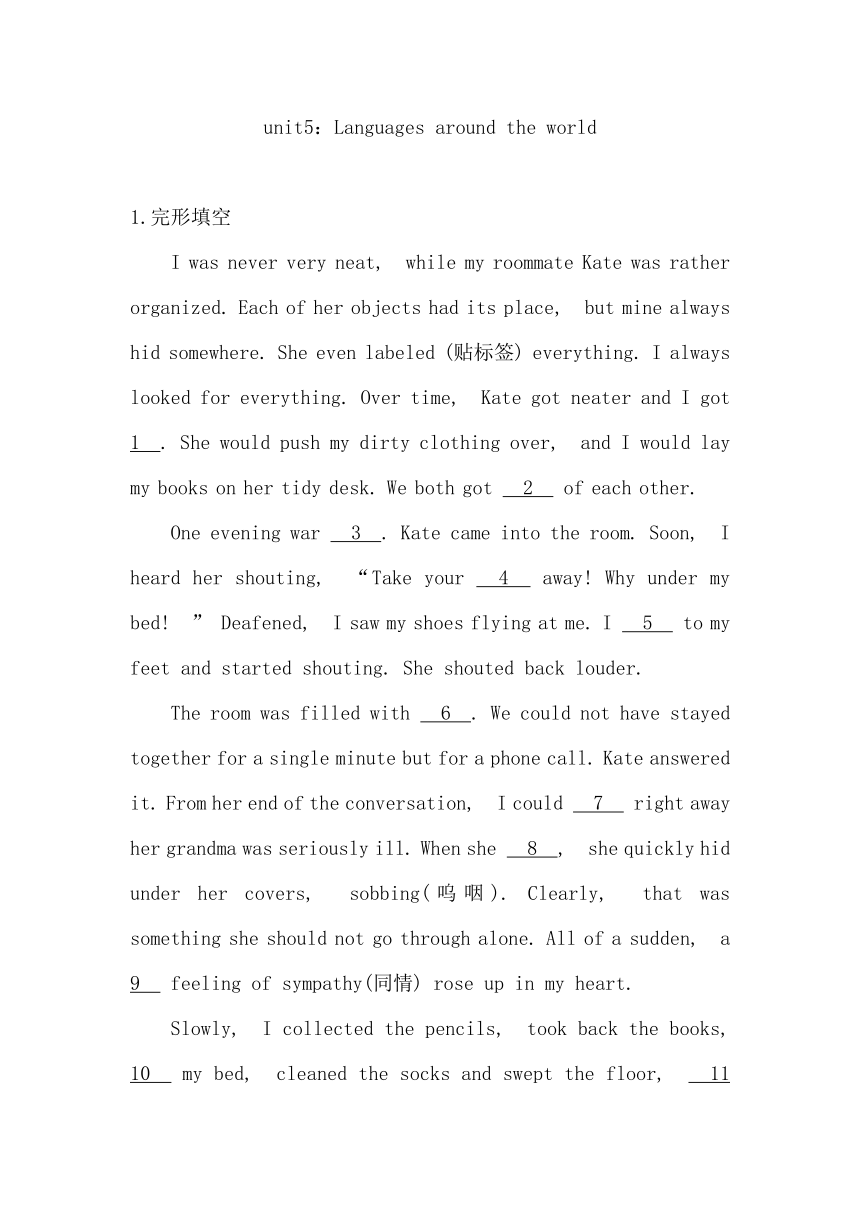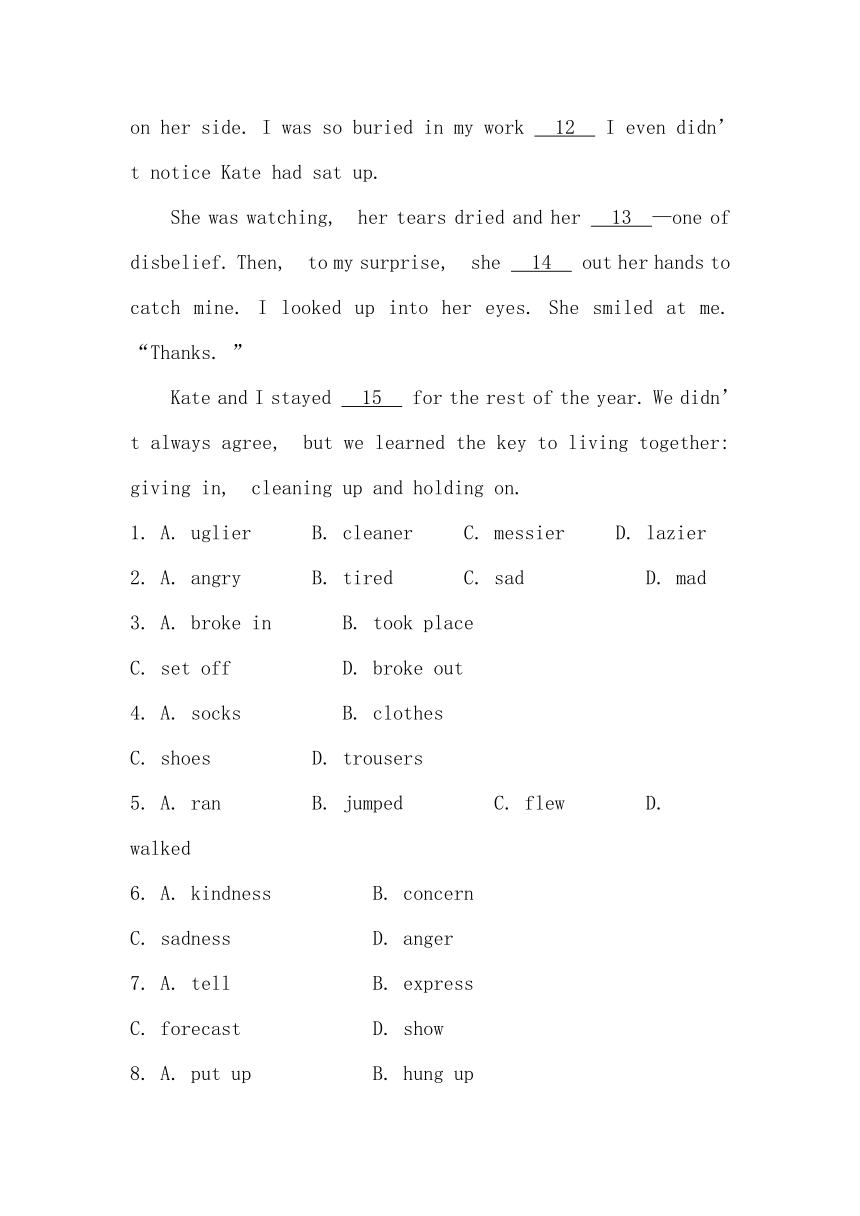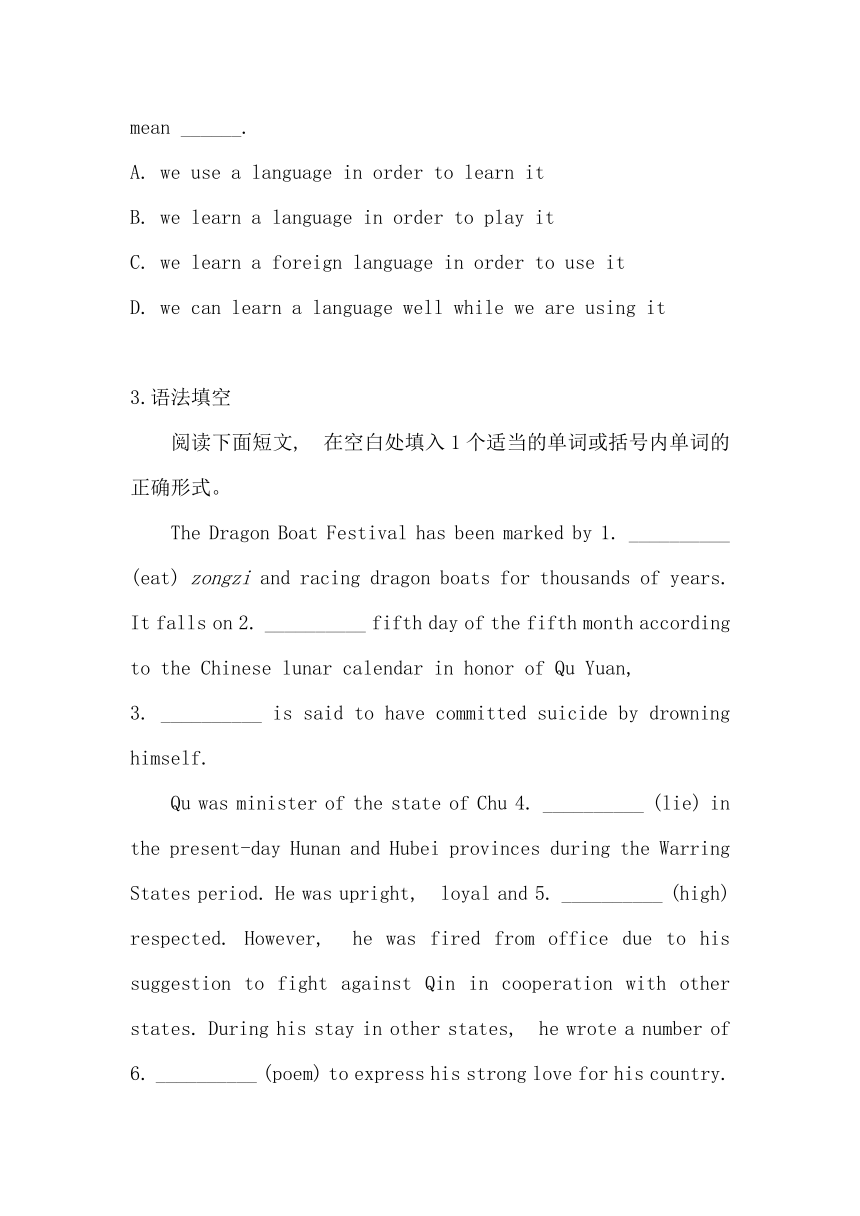2021-2022学年人教版(2019)必修一:Unit 5 Languages around the world 同步练习(含答案)
文档属性
| 名称 | 2021-2022学年人教版(2019)必修一:Unit 5 Languages around the world 同步练习(含答案) |  | |
| 格式 | docx | ||
| 文件大小 | 32.3KB | ||
| 资源类型 | 教案 | ||
| 版本资源 | 人教版(2019) | ||
| 科目 | 英语 | ||
| 更新时间 | 2021-09-04 19:31:05 | ||
图片预览





文档简介
unit5:Languages
around
the
world
1.完形填空
I
was
never
very
neat,
while
my
roommate
Kate
was
rather
organized.
Each
of
her
objects
had
its
place,
but
mine
always
hid
somewhere.
She
even
labeled
(贴标签)
everything.
I
always
looked
for
everything.
Over
time,
Kate
got
neater
and
I
got
1 .
She
would
push
my
dirty
clothing
over,
and
I
would
lay
my
books
on
her
tidy
desk.
We
both
got
2
of
each
other.
?
One
evening
war
3 .
Kate
came
into
the
room.
Soon,
I
heard
her
shouting,
“Take
your
4
away!
Why
under
my
bed!
”
Deafened,
I
saw
my
shoes
flying
at
me.
I
5
to
my
feet
and
started
shouting.
She
shouted
back
louder.
?
The
room
was
filled
with
6 .
We
could
not
have
stayed
together
for
a
single
minute
but
for
a
phone
call.
Kate
answered
it.
From
her
end
of
the
conversation,
I
could
7
right
away
her
grandma
was
seriously
ill.
When
she
8 ,
she
quickly
hid
under
her
covers,
sobbing(呜咽).
Clearly,
that
was
something
she
should
not
go
through
alone.
All
of
a
sudden,
a
9
feeling
of
sympathy(同情)
rose
up
in
my
heart.
?
Slowly,
I
collected
the
pencils,
took
back
the
books,
10
my
bed,
cleaned
the
socks
and
swept
the
floor,
11
on
her
side.
I
was
so
buried
in
my
work
12
I
even
didn’t
notice
Kate
had
sat
up.
?
She
was
watching,
her
tears
dried
and
her
13 —one
of
disbelief.
Then,
to
my
surprise,
she
14
out
her
hands
to
catch
mine.
I
looked
up
into
her
eyes.
She
smiled
at
me.
“Thanks.
”?
Kate
and
I
stayed
15
for
the
rest
of
the
year.
We
didn’t
always
agree,
but
we
learned
the
key
to
living
together:
giving
in,
cleaning
up
and
holding
on.
?
1.
A.
uglier
B.
cleaner
C.
messier
D.
lazier
2.
A.
angry
B.
tired
C.
sad
D.
mad
3.
A.
broke
in
B.
took
place
C.
set
off
D.
broke
out
4.
A.
socks
B.
clothes
C.
shoes
D.
trousers
5.
A.
ran
B.
jumped
C.
flew
D.
walked
6.
A.
kindness
B.
concern
C.
sadness
D.
anger
7.
A.
tell
B.
express
C.
forecast
D.
show
8.
A.
put
up
B.
hung
up
C.
held
up
D.
went
up
9.
A.
warm
B.
strange
C.
cold
D.
funny
10.
A.
brought
B.
caught
C.
made
D.
changed
11.
A.
but
B.
and
C.
even
D.
so
12.
A.
that
B.
which
C.
what
D.
who
13.
A.
tongue
B.
expression
C.
sign
D.
position
14.
A.
took
B.
held
C.
reached
D.
threw
15.
A.
workmates
B.
classmates
C.
deskmates
D.
roommates
2.阅读理解
In
order
to
know
a
foreign
language
thoroughly
(完全地),
four
things
are
necessary.
First,
we
must
understand
the
language
when
we
hear
it
spoken.
Secondly,
we
must
be
able
to
speak
it
ourselves,
correctly
with
confidence
and
without
hesitation
(犹豫).
Thirdly,
we
must
read
in
the
language
as
much
as
possible.
Besides,
we
must
be
able
to
write
it.
We
must
be
able
to
make
sentences
that
are
correct
in
grammar.
There
is
no
short
way
to
succeed
in
language
learning.
A
good
memory
(记忆)
is
of
great
help,
but
it
is
not
enough
only
to
memorize
the
rules
from
a
grammar
book.
It
is
no
much
use
learning
by
heart
long
lists
of
words
and
their
meanings,
studying
the
dictionary,
and
so
on.
We
must
learn
by
using
the
language.
If
we
are
pleased
with
a
few
rules
we
have
memorized,
we
are
not
really
learning
the
language.
We
must
“learn
through
use”.
Practice
is
important.
We
must
practise
speaking
and
writing
the
language
whenever
we
can.
?
1.
The
most
important
things
to
learn
a
foreign
language
are
______.
?
A.
understanding
and
speaking
B.
hearing,
speaking,
reading
and
writing
C.
writing
and
understanding
D.
memorizing
and
listening
2.
One
can
never
learn
a
foreign
language
well
only
by
______.
?
A.
much
practice
B.
studying
the
dictionary
C.
learning
through
use
D.
using
the
language
3.
Which
of
the
following
is
the
most
important
in
learning
a
foreign
language?
A.
A
good
memory.
B.
Speaking.
C.
Practice.
D.
Writing.
4.
The
underlined
words
“learn
through
use”
in
Paragraph
2
mean
______.
?
A.
we
use
a
language
in
order
to
learn
it
B.
we
learn
a
language
in
order
to
play
it
C.
we
learn
a
foreign
language
in
order
to
use
it
D.
we
can
learn
a
language
well
while
we
are
using
it
3.语法填空
阅读下面短文,
在空白处填入1个适当的单词或括号内单词的正确形式。
The
Dragon
Boat
Festival
has
been
marked
by
1.
__________
(eat)
zongzi
and
racing
dragon
boats
for
thousands
of
years.
It
falls
on
2.
__________
fifth
day
of
the
fifth
month
according
to
the
Chinese
lunar
calendar
in
honor
of
Qu
Yuan,
3.
__________
is
said
to
have
committed
suicide
by
drowning
himself.
?
Qu
was
minister
of
the
state
of
Chu
4.
__________
(lie)
in
the
present-day
Hunan
and
Hubei
provinces
during
the
Warring
States
period.
He
was
upright,
loyal
and
5.
__________
(high)
respected.
However,
he
was
fired
from
office
due
to
his
suggestion
to
fight
against
Qin
in
cooperation
with
other
states.
During
his
stay
in
other
states,
he
wrote
a
number
of
6.
__________
(poem)
to
express
his
strong
love
for
his
country.
When
Chu
7.
__________
(defeat)
by
Qin,
he
realized
what
he
could
do
about
it
was
nothing.
Qu
jumped
into
Miluo
River
on
the
fifth
day
of
the
fifth
month.
?
After
the
8.
__________
(die)
of
Qu
Yuan,
people
of
Chu
went
to
Miluo
River
to
mourn
over
the
great
poet
they
loved
so
much.
People
threw
eggs
and
rice
wrapped
in
leaves
9.
__________
the
river
to
feed
the
fish
to
keep
them
away
from
Qu
Yuan.
Now
the
Dragon
Boat
Festival
has
become
a
10.
__________
(tradition)festival
for
the
Chinese
people.
?
参考答案:
完形填空
1.C。逻辑推理题。根据第一句“I
was
never
very
neat”可知,
“我”不爱干净,
与Kate习惯相反,
所以一段时间以后,
“我”变得更邋遢了。故选C。
2.B。习惯搭配题。get/be
tired
of厌烦。根据文意可知作者和Kate开始互相厌烦。故选B。
3.D。短语辨析题。broke
in闯入,
打断;
took
place发生,
举办;
set
off出发,
引爆,
引发;
broke
out(战争、火灾等)爆发。有一天晚上,
战争(终于)爆发了。故选D。
4.C。逻辑推理题。根据下文“I
saw
my
shoes
flying
at
me”可知,
是“我”的鞋子在Kate的床下。故选C。
5.B。固定搭配题。jump
to
one’s
feet一跃而起,
跳起来。Kate把鞋子扔向了“我”,
“我”跳起来朝她大叫。故选B。
6.D。背景常识题。俩人吵架,
自然都很生气。故选D。
7.A。词语辨析题。tell告诉,
辨别;
express表达;
forecast预测;
show展示,
显示,
引,
带。“我”能从Kate说的话听出来,
她奶奶得了重病。故选A。
8.B。短语辨析题。put
up举起,
留宿,
张贴;
hung
up挂断,
结束;
held
up举起,
阻碍;
went
up上升。挂断电话之后,
她立刻呜咽起来。故选B。
9.A。词语辨析题。warm温暖的;
strange奇怪的;
cold寒冷的;
funny滑稽的。句意:
突然,
一股同情的暖流流经内心。故选A。
10.C。习惯搭配题。make
one’s
bed铺床。根据下文“cleaned
the
socks
and
swept
the
floor”可知,
“我”开始整理自己的东西,
包括铺床。故选C。
11.C。逻辑推理题。“我”甚至连Kate那边的地板也打扫了。故选C。
12.A。固定句式题。so.
.
.
that.
.
.
如此……以至于……“我”太投入了,
以至于没有注意到Kate坐起来。故选A。
13.B。词语辨析题。
tongue舌头,
语言;
expression表情,
表达;
sign符号,
手势,
迹象;
position位置,
职位。她的脸上露出不敢相信眼前的景象的表情。故选B。
14.C。take带走;
hold
握住,
拿,
容纳;
reach
到达,
伸出;
throw扔掉。她伸出手来抓住“我”的手,
reach
out伸出。故选C。
15.D。逻辑推理题。workmate
同事;
classmate同学;
deskmate
同桌;
roommate室友。根据文章内容可知,
两人是室友。故选D。
2.阅读理解
1.B。推理判断题。根据第一段中的First,
.
.
.
Secondly,
.
.
.
Thirdly,
.
.
.
Besides,
.
.
.
可知学习一门外语,
最重要的是“听、说、读、写”。
2.B。细节理解题。根据第二段可知“记单词表和单词的意思以及研究词典都是没有多大用处的”。也就是说单靠研究词典是不能学好一门外语的。
3.C。细节理解题。根据文章最后两句可知,
学习一门外语,
最重要的就是练习。
4.D。词义猜测题。根据文章最后两句可知,
练习很重要,
所以说我们要在使用中学习语言。
3.语法填空
1.eating。考查固定搭配。by
doing
sth.
是固定搭配“通过做某事”,
故填eating。
2.
the。考查冠词。序数词前面用定冠词the,
表示“第几”,
故填the。
3.
who。考查定语从句。此处Qu
Yuan是先行词,
指人,
并在后面的非限制性定语从句中作主语,
故填who。
4.
lying。考查非谓语动词。此处Chu
和lie之间是主动关系,
用现在分词作后置定语,
故填lying。
5.
highly。考查副词。此处副词修饰动词,
故填highly。
6.
poems。考查名词复数。a
number
of后跟名词复数,
表示“许多,
大量的”,
故填poems。
7.
was
defeated。考查时态和语态。此处主语Chu
和defeat之间是被动关系,
且指过去的事情,
所以句子用一般过去时的被动语态,
故填was
defeated。
8.
death。考查名词。在定冠词the之后,
介词of之前需用名词形式,
故填death。
9.
into。考查固定搭配。throw.
.
.
into.
.
.
把……扔进……句意:
人们把鸡蛋和裹着叶子的米饭扔进河里喂鱼,
使它们远离屈原。故填into。
10.traditional。考查形容词。此处是形容词修饰名词,
故填traditional。
around
the
world
1.完形填空
I
was
never
very
neat,
while
my
roommate
Kate
was
rather
organized.
Each
of
her
objects
had
its
place,
but
mine
always
hid
somewhere.
She
even
labeled
(贴标签)
everything.
I
always
looked
for
everything.
Over
time,
Kate
got
neater
and
I
got
1 .
She
would
push
my
dirty
clothing
over,
and
I
would
lay
my
books
on
her
tidy
desk.
We
both
got
2
of
each
other.
?
One
evening
war
3 .
Kate
came
into
the
room.
Soon,
I
heard
her
shouting,
“Take
your
4
away!
Why
under
my
bed!
”
Deafened,
I
saw
my
shoes
flying
at
me.
I
5
to
my
feet
and
started
shouting.
She
shouted
back
louder.
?
The
room
was
filled
with
6 .
We
could
not
have
stayed
together
for
a
single
minute
but
for
a
phone
call.
Kate
answered
it.
From
her
end
of
the
conversation,
I
could
7
right
away
her
grandma
was
seriously
ill.
When
she
8 ,
she
quickly
hid
under
her
covers,
sobbing(呜咽).
Clearly,
that
was
something
she
should
not
go
through
alone.
All
of
a
sudden,
a
9
feeling
of
sympathy(同情)
rose
up
in
my
heart.
?
Slowly,
I
collected
the
pencils,
took
back
the
books,
10
my
bed,
cleaned
the
socks
and
swept
the
floor,
11
on
her
side.
I
was
so
buried
in
my
work
12
I
even
didn’t
notice
Kate
had
sat
up.
?
She
was
watching,
her
tears
dried
and
her
13 —one
of
disbelief.
Then,
to
my
surprise,
she
14
out
her
hands
to
catch
mine.
I
looked
up
into
her
eyes.
She
smiled
at
me.
“Thanks.
”?
Kate
and
I
stayed
15
for
the
rest
of
the
year.
We
didn’t
always
agree,
but
we
learned
the
key
to
living
together:
giving
in,
cleaning
up
and
holding
on.
?
1.
A.
uglier
B.
cleaner
C.
messier
D.
lazier
2.
A.
angry
B.
tired
C.
sad
D.
mad
3.
A.
broke
in
B.
took
place
C.
set
off
D.
broke
out
4.
A.
socks
B.
clothes
C.
shoes
D.
trousers
5.
A.
ran
B.
jumped
C.
flew
D.
walked
6.
A.
kindness
B.
concern
C.
sadness
D.
anger
7.
A.
tell
B.
express
C.
forecast
D.
show
8.
A.
put
up
B.
hung
up
C.
held
up
D.
went
up
9.
A.
warm
B.
strange
C.
cold
D.
funny
10.
A.
brought
B.
caught
C.
made
D.
changed
11.
A.
but
B.
and
C.
even
D.
so
12.
A.
that
B.
which
C.
what
D.
who
13.
A.
tongue
B.
expression
C.
sign
D.
position
14.
A.
took
B.
held
C.
reached
D.
threw
15.
A.
workmates
B.
classmates
C.
deskmates
D.
roommates
2.阅读理解
In
order
to
know
a
foreign
language
thoroughly
(完全地),
four
things
are
necessary.
First,
we
must
understand
the
language
when
we
hear
it
spoken.
Secondly,
we
must
be
able
to
speak
it
ourselves,
correctly
with
confidence
and
without
hesitation
(犹豫).
Thirdly,
we
must
read
in
the
language
as
much
as
possible.
Besides,
we
must
be
able
to
write
it.
We
must
be
able
to
make
sentences
that
are
correct
in
grammar.
There
is
no
short
way
to
succeed
in
language
learning.
A
good
memory
(记忆)
is
of
great
help,
but
it
is
not
enough
only
to
memorize
the
rules
from
a
grammar
book.
It
is
no
much
use
learning
by
heart
long
lists
of
words
and
their
meanings,
studying
the
dictionary,
and
so
on.
We
must
learn
by
using
the
language.
If
we
are
pleased
with
a
few
rules
we
have
memorized,
we
are
not
really
learning
the
language.
We
must
“learn
through
use”.
Practice
is
important.
We
must
practise
speaking
and
writing
the
language
whenever
we
can.
?
1.
The
most
important
things
to
learn
a
foreign
language
are
______.
?
A.
understanding
and
speaking
B.
hearing,
speaking,
reading
and
writing
C.
writing
and
understanding
D.
memorizing
and
listening
2.
One
can
never
learn
a
foreign
language
well
only
by
______.
?
A.
much
practice
B.
studying
the
dictionary
C.
learning
through
use
D.
using
the
language
3.
Which
of
the
following
is
the
most
important
in
learning
a
foreign
language?
A.
A
good
memory.
B.
Speaking.
C.
Practice.
D.
Writing.
4.
The
underlined
words
“learn
through
use”
in
Paragraph
2
mean
______.
?
A.
we
use
a
language
in
order
to
learn
it
B.
we
learn
a
language
in
order
to
play
it
C.
we
learn
a
foreign
language
in
order
to
use
it
D.
we
can
learn
a
language
well
while
we
are
using
it
3.语法填空
阅读下面短文,
在空白处填入1个适当的单词或括号内单词的正确形式。
The
Dragon
Boat
Festival
has
been
marked
by
1.
__________
(eat)
zongzi
and
racing
dragon
boats
for
thousands
of
years.
It
falls
on
2.
__________
fifth
day
of
the
fifth
month
according
to
the
Chinese
lunar
calendar
in
honor
of
Qu
Yuan,
3.
__________
is
said
to
have
committed
suicide
by
drowning
himself.
?
Qu
was
minister
of
the
state
of
Chu
4.
__________
(lie)
in
the
present-day
Hunan
and
Hubei
provinces
during
the
Warring
States
period.
He
was
upright,
loyal
and
5.
__________
(high)
respected.
However,
he
was
fired
from
office
due
to
his
suggestion
to
fight
against
Qin
in
cooperation
with
other
states.
During
his
stay
in
other
states,
he
wrote
a
number
of
6.
__________
(poem)
to
express
his
strong
love
for
his
country.
When
Chu
7.
__________
(defeat)
by
Qin,
he
realized
what
he
could
do
about
it
was
nothing.
Qu
jumped
into
Miluo
River
on
the
fifth
day
of
the
fifth
month.
?
After
the
8.
__________
(die)
of
Qu
Yuan,
people
of
Chu
went
to
Miluo
River
to
mourn
over
the
great
poet
they
loved
so
much.
People
threw
eggs
and
rice
wrapped
in
leaves
9.
__________
the
river
to
feed
the
fish
to
keep
them
away
from
Qu
Yuan.
Now
the
Dragon
Boat
Festival
has
become
a
10.
__________
(tradition)festival
for
the
Chinese
people.
?
参考答案:
完形填空
1.C。逻辑推理题。根据第一句“I
was
never
very
neat”可知,
“我”不爱干净,
与Kate习惯相反,
所以一段时间以后,
“我”变得更邋遢了。故选C。
2.B。习惯搭配题。get/be
tired
of厌烦。根据文意可知作者和Kate开始互相厌烦。故选B。
3.D。短语辨析题。broke
in闯入,
打断;
took
place发生,
举办;
set
off出发,
引爆,
引发;
broke
out(战争、火灾等)爆发。有一天晚上,
战争(终于)爆发了。故选D。
4.C。逻辑推理题。根据下文“I
saw
my
shoes
flying
at
me”可知,
是“我”的鞋子在Kate的床下。故选C。
5.B。固定搭配题。jump
to
one’s
feet一跃而起,
跳起来。Kate把鞋子扔向了“我”,
“我”跳起来朝她大叫。故选B。
6.D。背景常识题。俩人吵架,
自然都很生气。故选D。
7.A。词语辨析题。tell告诉,
辨别;
express表达;
forecast预测;
show展示,
显示,
引,
带。“我”能从Kate说的话听出来,
她奶奶得了重病。故选A。
8.B。短语辨析题。put
up举起,
留宿,
张贴;
hung
up挂断,
结束;
held
up举起,
阻碍;
went
up上升。挂断电话之后,
她立刻呜咽起来。故选B。
9.A。词语辨析题。warm温暖的;
strange奇怪的;
cold寒冷的;
funny滑稽的。句意:
突然,
一股同情的暖流流经内心。故选A。
10.C。习惯搭配题。make
one’s
bed铺床。根据下文“cleaned
the
socks
and
swept
the
floor”可知,
“我”开始整理自己的东西,
包括铺床。故选C。
11.C。逻辑推理题。“我”甚至连Kate那边的地板也打扫了。故选C。
12.A。固定句式题。so.
.
.
that.
.
.
如此……以至于……“我”太投入了,
以至于没有注意到Kate坐起来。故选A。
13.B。词语辨析题。
tongue舌头,
语言;
expression表情,
表达;
sign符号,
手势,
迹象;
position位置,
职位。她的脸上露出不敢相信眼前的景象的表情。故选B。
14.C。take带走;
hold
握住,
拿,
容纳;
reach
到达,
伸出;
throw扔掉。她伸出手来抓住“我”的手,
reach
out伸出。故选C。
15.D。逻辑推理题。workmate
同事;
classmate同学;
deskmate
同桌;
roommate室友。根据文章内容可知,
两人是室友。故选D。
2.阅读理解
1.B。推理判断题。根据第一段中的First,
.
.
.
Secondly,
.
.
.
Thirdly,
.
.
.
Besides,
.
.
.
可知学习一门外语,
最重要的是“听、说、读、写”。
2.B。细节理解题。根据第二段可知“记单词表和单词的意思以及研究词典都是没有多大用处的”。也就是说单靠研究词典是不能学好一门外语的。
3.C。细节理解题。根据文章最后两句可知,
学习一门外语,
最重要的就是练习。
4.D。词义猜测题。根据文章最后两句可知,
练习很重要,
所以说我们要在使用中学习语言。
3.语法填空
1.eating。考查固定搭配。by
doing
sth.
是固定搭配“通过做某事”,
故填eating。
2.
the。考查冠词。序数词前面用定冠词the,
表示“第几”,
故填the。
3.
who。考查定语从句。此处Qu
Yuan是先行词,
指人,
并在后面的非限制性定语从句中作主语,
故填who。
4.
lying。考查非谓语动词。此处Chu
和lie之间是主动关系,
用现在分词作后置定语,
故填lying。
5.
highly。考查副词。此处副词修饰动词,
故填highly。
6.
poems。考查名词复数。a
number
of后跟名词复数,
表示“许多,
大量的”,
故填poems。
7.
was
defeated。考查时态和语态。此处主语Chu
和defeat之间是被动关系,
且指过去的事情,
所以句子用一般过去时的被动语态,
故填was
defeated。
8.
death。考查名词。在定冠词the之后,
介词of之前需用名词形式,
故填death。
9.
into。考查固定搭配。throw.
.
.
into.
.
.
把……扔进……句意:
人们把鸡蛋和裹着叶子的米饭扔进河里喂鱼,
使它们远离屈原。故填into。
10.traditional。考查形容词。此处是形容词修饰名词,
故填traditional。
